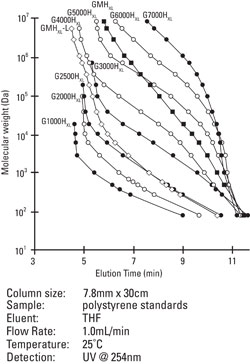TSKgel HXL Columns for Reduced Polymer Adsorption and Limited Solvent Range
The TSKgel HXL column lines consists of eight columns with different pore sizes, TSKgel G1000HXL through TSKgel G7000HXL, and three columns with an extended linear range of the calibration curve, TSKgel GMHXL, TSKgel GMHXL-L and TSKgel MultiporeHXL-M. The calibration curves are shown to the right.
Main characteristics
- Ultra-low sample adsorption, i.e., the columns show true size exclusion behavior for most polymers
- Maximum operating temperature for TSKgel HXL-type columns is 60 ºC for G1000HXL, G2000HXL, G2500HXL and G3000HXL, and 80 ºC for the remaining columns in the product line. See TSKgel HHR-type columns for operating temperatures of 140 ºC.
- Limited solvent range. The columns are shipped in THF, which can be exchanged for a limited number of organic solvents (see Table below)
- TSKgel HXL-type columns are conventional GPC columns with column dimensions of 7.8 mm ID x 30 cm. Most HPLC systems do not require optimization of extra-column bandbroadening effects when working with conventional GPC columns.
|
|
Calibration Curves for TSKgel HXL Columns with Polystyrene Standards

|
Solvent compatibility for TSKgel HXL columns
The column shipping solvent limits the types of solvents that can be used with each column type.
Shipping Solvent
|
Can Be Replaced With
|
| Tetrahydrofuran 2,3 |
benzene, chloroform, toluene, xylene,
dichloromethane, dichloroethane
|
| Acetone** |
carbon tetrachloride4, o-dichlorobenzene, dimethylformamide,
dodecane, dimethyl sulfoxide, dioxane, ethylacetate,
FC-113, hexane, pyridine, hexafluoroisopropanol/chloroform,
methyl ethyl ketone, quinoline, cyclohexane
|
| Chloroform** |
m-cresol in chloroform, up to 10%
hexafluoroisopropanol in chloroform
|
| Dimethylformamide |
dimethyl sulfoxide, dioxane, tetrahydrofuran, toluene |
| o-Dichlorobenzene |
1-chloronaphthalene, trichlorobenzene |
- In case of TSKgel HXL, keep flow rate below <0.5 mL/min during solvent change. Solvent can be changed one way/one time only.
- All TSKgel HXL, HHR, SuperHZ, SuperH and GMH analytical columns are shipped containing tetrahydrofuran (THF), except TSKgel GMH-HT columns, which contain o-dichlorobenzene.
- THF in TSKgel G1000HXL columns cannot be replaced with dichloromethane or dichloroethane.
- Prolonged exposure to carbon tetrachloride can corrode the stainless steel parts of a column and an HPLC system.
* 100% methanol cannot be used with TSKgel H-type columns; use this solvent with TSKgel SW-type or Alpha-type columns.
** TSKgel H columns may be specially ordered with this shipping solvent.
polystyrene, epoxy resin, phenoxy resin, polycarbonate, polyisoprene, polyvinyl acetate, polyvinyl chloride, monoglycerides, fatty acids, poly(butadiene), polybutadiene, poly(methyl methacrylate), poly(styrene-butadiene), poly(styrene-acrylonitrile)
Recommended Solvent
|
Application
|
| THF |
polystyrene, epoxy resin, phenoxy resin, polycarbonate,
polyisoprene, polyvinyl acetate, polyvinyl chloride,
monoglycerides, fatty acids, poly(butadiene),
polybutadiene, poly(methyl methacrylate),
poly(styrene-butadiene), poly(styrene-acrylonitrile) |
N,N-Dimethylformamide (DMF) +/- 5mM LiBr
|
polyvinyl chloride, polyvinyl fluoride, urea resins,
polyurethane, polystyrene, polyester,
polyimido ether, polyimido ester,
polyphenol (aqueous solution), polyacrylonitrile
|
o-Dichlorobenzene (ODCB)
|
polyethylene, polypropylene
|
| Chloroform |
polycarboxylic ether, acrylic resin,
epoxy resin, polystyrene |
| m-Cresol/Chloroform |
nylon, polyester, polyamide,
poly(ethylene terephthalate) |
| Toluene |
polybutadiene, polysiloxane |
Columns with linear calibration curves
Two of the linear columns are so-called mixed-bed columns, in which particles with different pore sizes are blended to provide an extended linear calibration curve. The remaining column is a so-called multi-pore column, in which each particle contains a range of pore sizes that provide a linear calibration curve. The innovative multi-pore approach, pioneered by Tosoh, is a synthetic chemistry answer to the question of how to obtain a column with an extended linear calibration curve, while mixed-bed columns represent a mechanical way of obtaining a linear calibration curve. In general, Multipore columns have a smoother, more linear, calibration curve. See the product page for Multi-pore Technology for the principles behind mixed-bed and multi-pore columns.